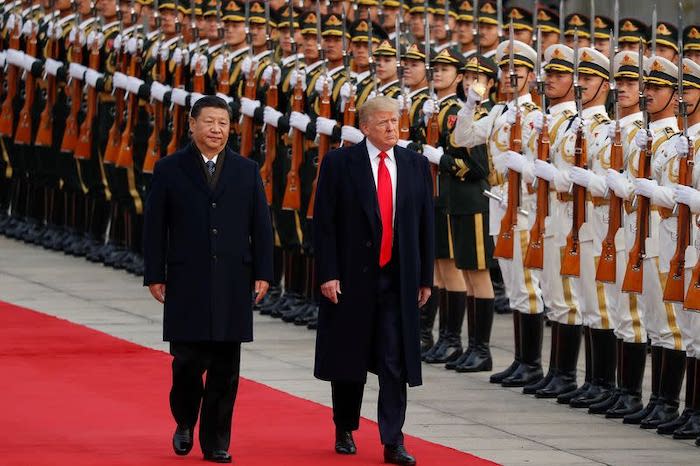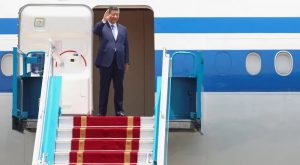China wants to sit down with officials from the new Trump administration to see if it can negotiate a deal to avoid a new trade war, analysts say.
Beijing is looking for bargaining chips to start talks with the new US government to negate any additional trade tariffs and and other potentially harmful blows to its already fragile economy, they say.
As Donald Trump steps up his tariff threats against China, Beijing is moving to beat the next US president to the punch with its own restrictions and get Washington to the negotiating table ahead of a full-blown trade war, analysts say.
ALSO SEE: Amid Tariff Tiff, Trump ‘Invites China’s Xi to Inauguration’
Armed with the lessons of the last trade war during Trump’s first term, China is seeking incentives to bargain on contentious aspects of bilateral ties, such as trade, investment, and science and technology. It fears harmful economic impacts from new tariffs, they say.
This week, China launched a probe into US chip giant Nvidia over what it claimed were suspected antitrust violations, which follows its ban on US-bound exports of rare minerals.
“We have to look at this as the opening bid in what will likely ultimately turn into a negotiation with the US rather than just an imposition of tariffs and everyone walks away,” HSBC’s Chief Asia Economist Fred Neumann said.
China is better prepared to deal with almost any tariffs, short of an “Armageddon announcement” of a 60% tariff on all Chinese goods, George Magnus, research associate at Oxford University’s China Centre, said.
The world’s second-largest economy now globally dominates sectors such as electric vehicles and green energy, and has less need for the Boeing jets and large gasoline-fuelled cars it bought back in 2017, having found substitutes such as Airbus airplanes and its own Comac C919.
But China is far from self-sufficient.
A new trade war with the world’s biggest economy would still hurt China more, analysts say, as Washington can levy ever-larger import duties on its goods and further rip China from its supply chains
China still needs to import strategic materials from the US such as advanced microchips and other high-tech equipment and counts on US consumers to buy its goods, given an increasingly pessimistic global trade outlook and weak domestic consumer demand.
Beijing wants to sit down with Trump before he places more curbs on US high-tech exports and to secure the renewal of the US-China Science and Technology Agreement, said Alicia Garcia-Herrero, chief economist for the Asia Pacific at Natixis.
The agreement, which enables scientific collaboration between the two countries, lapsed in August and negotiations over its renewal are unlikely to be completed before Trump’s January 20 inauguration.
While China’s Huawei has heavily invested in its advanced chip-making capabilities, their commercial viability remains unclear, she added, incentivising China’s negotiators to sit down with their US counterparts to strike a deal ensuring a steady supply of American-made chips.
Energy, food deals possible
Beijing took two years before it agreed to buy an extra $200 billion in American goods and services, per the terms of the “Phase One” agreement which ended the first trade war.
This time, China has new carrots to dangle, such as increasing purchases of oil and liquefied natural gas, as the US is currently pumping out more than it can consume.
“Trump bragged on the campaign trail: ‘Drill baby, drill,’ so (he) will need the demand support,” Bo Zhengyuan, a Shanghai-based partner at consultancy Plenum, said.
Given the increasing restrictions on the export of chips, agricultural goods, commodities and energy are among the items the US can still sell to China, Bo said.
China’s commerce ministry said it was open to engaging and communicating with the economic and trade teams of the Trump administration, when asked for comment.
But Beijing also has sticks to beat Washington with, if the US side feels China’s failure to meet its previous purchase commitments means it will gain more from tariffs than talks.
US firms feeling shut out
US firms are already feeling the squeeze, Michael Hart, president of the American Chamber of Commerce in China, said.
“US companies and other foreign companies have really been concerned about whether they actually have access to this market,” Hart said. “Can we even sell into China anymore? Is there an outright ban on us?”
Business sentiment among US firms in China is at its lowest since 1999, according to a September survey by the American Chamber’s Shanghai chapter.
There are also non-economic factors at play. Trump has pledged additional tariffs of 10% on Chinese goods to push Beijing to do more to stop fentanyl flows into the US.
“Using political justifications for the imposition of trade restrictions ultimately makes the tensions much more intractable,” HSBC’s Neumann said.
The fentanyl tariffs also mirror China’s import curbs on trading partners that displease Beijing over issues such as human rights, Taiwan and the South China Sea.
“It’s taking a leaf out of China’s manual of coercion,” Magnus said. “I think they would see it as a slap in the face.”
- Reuters with additional editing by Jim Pollard
ALSO SEE:
Nvidia ‘Facing $1bn Fine’ as China Opens Anti-Monopoly Probe
China Central Bank ‘to Allow a Weaker Yuan’ as Trade Risk Rises
Trump’s 100% Tariffs Warning to BRICS Rattles Asian Currencie
US to Review Ties With Hong Kong Banks, ‘City Now a Crime Hub’
Economists Say Trump Won’t Hit China With 60% Tariffs Early On
Chinese Vessel Suspected of Cutting Baltic Subsea Cables
Big US Banks Cut China Growth Outlook Amid Industrial Slowdown
US, EU Firms’ Profits, Confidence in China Continue to Sink
US Sanctions 8 Chinese Drug Companies for Fentanyl Trade
























